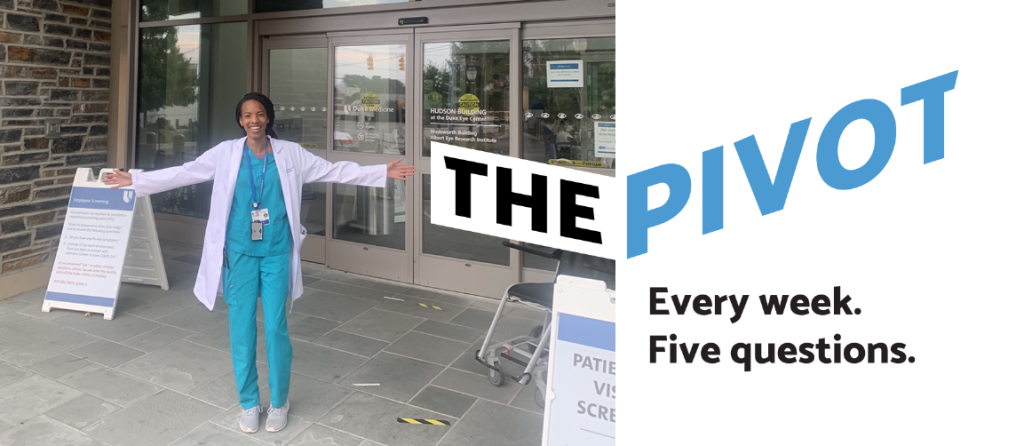Dr. Ceshae Harding is providing comprehensive care to women of childbearing age.

What’s your role in public health?
I’m currently a first-year Master of Science in Public Health student at Gillings and an internal medicine physician at Duke, where I recently finished my residency.
I focus primarily on reproductive-aged women who either have chronic medical conditions or had certain conditions during pregnancy, such as preeclampsia, gestational high blood pressure or gestational diabetes. These conditions place women at risk for things like chronic high blood pressure or diabetes and increase their risk of future adverse cardiovascular events. As a result, women who had these conditions during pregnancy would benefit greatly from consistent primary and preventative care within our health care system.
Women of childbearing age are generally assumed to be healthy, and oftentimes their first sustained interaction with the health care system is pregnancy. We’re increasingly diagnosing chronic medical conditions during pregnancy. The ideal would be for us to have women in care beforehand and help them optimize these conditions, thereby ensuring that they’re going into pregnancy as healthy as possible.
I recently started the Women’s Primary Care Clinic at the Duke Outpatient Clinic, which is a Duke facility. The purpose of the clinic is to provide comprehensive care for women of childbearing age. We receive referrals primarily from maternal-fetal medicine physicians who manage high-risk pregnancies so these patients can establish care and begin receiving primary care with me directly after pregnancy. It’s a unique system of practice.

Can you describe your focus area in one sentence?
I focus on advancing comprehensive care for women of childbearing age through clinical care, research and advocacy.

What brought you to public health?
My medical school education and internal medicine residency training prepared me well for the challenges of clinical medicine. However, I believe there are important objective skills that can only come from a public health education. In addition to gaining skills in research design and analysis, I wanted to get a better understanding of public health at-large and of public policy, which has implications in maternal health.
Prior to the pandemic, women in North Carolina were losing Medicaid insurance coverage 60 days postpartum; coverage has since been extended to 12 months postpartum. This has a profound impact on their ability to receive primary care after pregnancy. So, I very much understand that public policy influences the work that I can do.
While clinical medicine has a focus on the patient and provider, public health considers an entire population. So, as I’m trying to improve care for our large reproductive-aged population, I need a public health lens.

Can you describe a time where you have pivoted in your public health career?
I would call what I’m doing right now a pivot!
If I wanted only a research-focused career as an internal medicine doctor, the most straightforward way would be through a research fellowship — what I’m doing right now — in which I would learn the necessary research methods, statistical analysis and grant writing skills.
But this would likely not include learning about public health. This is a pivot for me, because public health is a personal love and being at Gillings brings invaluable perspective.

 Who are you when you’re at home?
Who are you when you’re at home?
My husband is a scientist. We have a supportive friendship, which is clearly important in marriage, but we’re also career buddies who encourage each other and talk through things. He’s a huge supporter of the health care infrastructure that I’m trying to establish, and we bounce ideas off each other often.
We love cooking and outdoor activities. I grew up in Florida, so if it’s sunny outside, I will be there.
Read more interviews in The Pivot series.
Published: 11/23/2022

